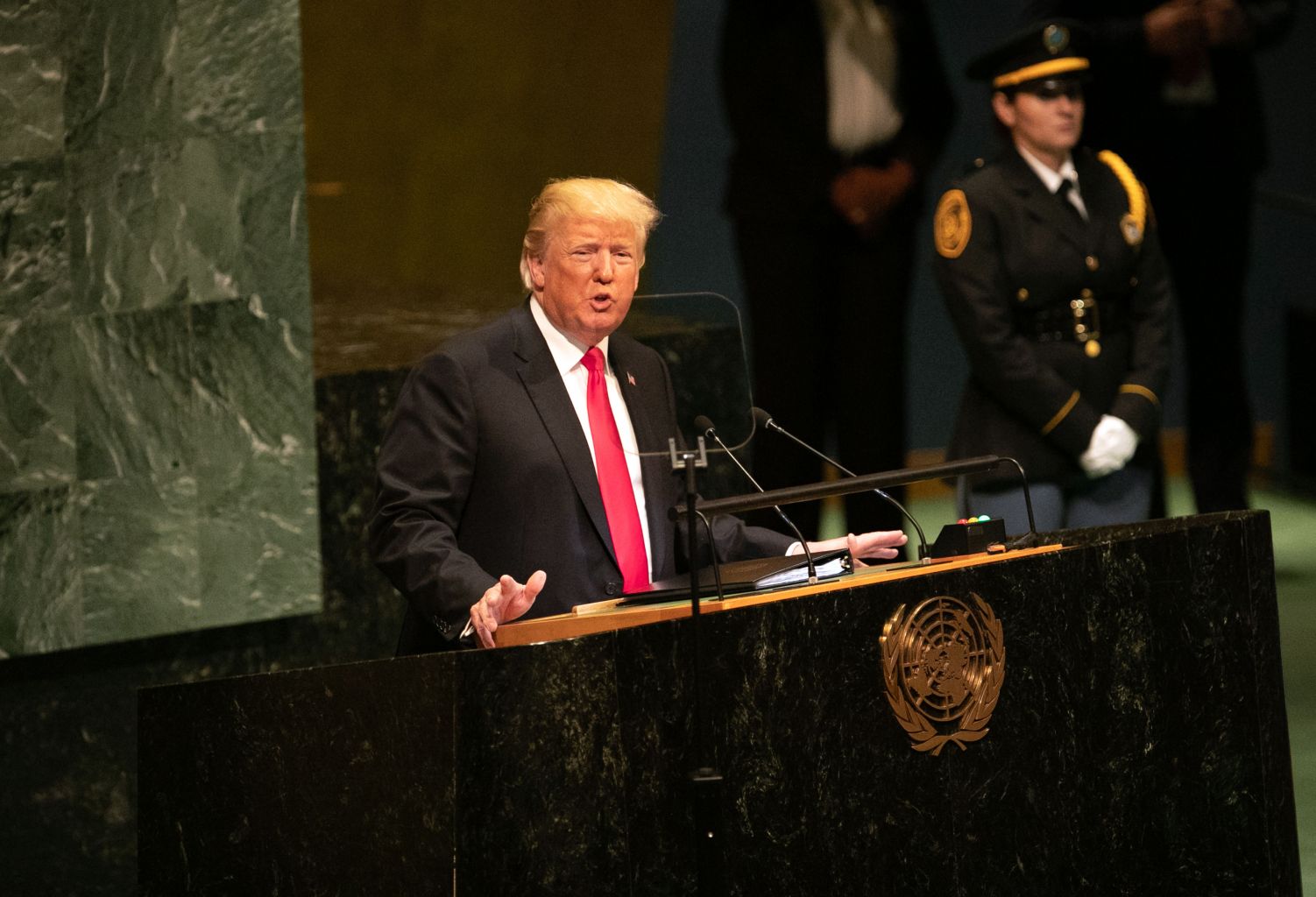Explaining how Trump broke away from facts in his UN speech
Sign up now: Get ST's newsletters delivered to your inbox

US President Donald Trump addressing the UN General Assembly at the UN headquarters in New York, on Sept 25, 2018.
PHOTO: BLOOMBERG
UNITED NATIONS (NYTIMES) - Addressing the world body's annual General Assembly meeting on Tuesday (Sept 25), United States President Donald Trump made inaccurate or misleading claims about his own record, the Islamic State, the war in Yemen, reactions to the Iran nuclear deal and the trade deficit.
The New York Times did a fact-check based on his speech and reported the following:
What Trump said: "In less than two years, my administration has accomplished more than almost any administration in the history of our country."
The facts: False.
Mr Trump rattled off a list of accomplishments on the economy, tax cuts, military spending and the border - many of them cherry-picked, exaggerated or false.
He is right that the US stock market is soaring, and unemployment rates for Hispanics, African-Americans and Asian-Americans have reached record lows.
But he omitted less-flattering indicators when describing an economy "booming like never before". For example, gross domestic product growth is healthy, but reached higher points as recently as 2014. The unemployment rate is at an 18-year low, but is higher than several months during the 1940s and 1960s. And wage growth is still slow: after adjusting for inflation, average hourly earnings increased just 0.2 per cent in August.
Mr Trump's claim of signing the "biggest" tax cut in American history is false; by various metrics, several rank higher.
He misleadingly said construction on the border wall with Mexico had begun; projects to replace fencing and barriers are underway, but the administration has not begun to build a 1,609km-long wall.
He was also wrong in characterising recent military spending Bills as "record funding". Even without adjusting for inflation, President Barack Obama signed legislation in 2010 that provided more money for the military.
Additionally, Mr Trump has signed a relatively low number of Bills when compared to other presidents, even at similar points in their terms.
While he can claim major legislative victories - on tax cuts and veterans' benefits - he has also been unable to deliver on other key campaign promises, like the border wall and repealing and replacing the Affordable Care Act.
What Trump said: "Thanks to the United States military and our partnership with many of your nations, I am pleased to report that the bloodthirsty killers known as ISIS have been driven out from the territory they once held in Iraq and Syria."
The facts: This is exaggerated.
Mr Trump's declaration of victory is slightly premature. The Islamic State in Iraq and Syria (ISIS) is down to its last 518 sq km, about 1 per cent of the territory it previously held in Iraq and Syria, The New York Times recently reported. Pentagon officials have stressed that their job is not done.
There are still "remaining pockets" of ISIS fighters in Syria and Iraq, and they continue to threaten the two countries' peace and security, Colonel Sean Ryan, a Defence Department spokesman, told reporters on Sept 18.
Defence Secretary Jim Mattis told reporters on Monday that US troops will continue to train and advise local security forces to make certain the Islamic State does not resurface. He said "fighting is ongoing" in Syria's Euphrates River Valley, where troops have battled the ISIS.
"I think that getting rid of the caliphate doesn't mean you then blindly say 'OK, we got rid of it', march out, and then wonder why the caliphate comes back,' Mr Mattis said.
"And how many times have we seen - look at even Iraq where they're still on the hunt for them. And they're still trying to come back."
What Trump said: "The UAE, Saudi Arabia, and Qatar have pledged billions of dollars to aid the people of Syria and Yemen, and they are pursuing multiple avenues to ending Yemen's horrible, horrific civil war."
The facts: This is misleading.
Mr Trump is right that the United Arab Emirates, Saudi Arabia and Qatar have contributed funds to ease humanitarian crises in Syria and Yemen. But his comment glosses over the three countries' roles in Yemen's civil war.
The governments of Saudi Arabia and the UAE are the top two donors to the United Nations' humanitarian response plan in Yemen, contributing nearly US$1 billion (S$1.36 billion) combined. Additionally, the two countries donated another US$375 million through other programmes, the data show.
Qatar also contributed US$500,000 to the UN response plan.
In Syria, Saudi Arabia donated US$18.6 million this year to the world body's humanitarian response plan and US$24.3 million in 2017. Qatar contributed US$2.2 million in 2018 and US$29.5 million last year, the same reports show.
Dollars aside, it's worth noting that the UN and human rights groups have said that the humanitarian crisis in Yemen has been exacerbated by the country's ongoing civil war.
A Saudi-led coalition - including the UAE and the US - has since 2015 fought Iranian-linked Houthi rebels who ousted the government of President Abed Rabbo Mansour Hadi of Yemen.
Qatar initially was part of the international coalition fighting the Houthi rebels, but was expelled last year after Riyadh accused the tiny nation of funding terrorism, cosying up to Iran and welcoming dissidents.
A report by UN investigators in August accused the Saudi-led coalition of potential war crimes, including charges of killing thousands of civilians in airstrikes, torturing detainees and conscripting child soldiers.
The same report also accused the Houthi rebels of possible war crimes.


